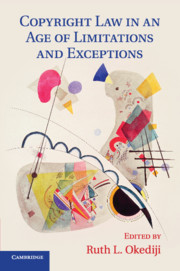Book contents
- Copyright Law in an Age of Limitations and Exceptions
- Copyright Law in an Age of Limitations and Exceptions
- Copyright page
- Dedication
- Contents
- Author Biographies
- Preface
- Introduction
- 1 Justifications for Copyright Limitations and Exceptions
- 2 The Role of the Author in Copyright*
- 3 A Few Observations about the State of Copyright Law
- 4 Fetishizing Copies
- 5 Copyright in a Digital Ecosystem
- 6 The Canadian Copyright Story
- 7 (When) Is Copyright Reform Possible?
- 8 Fair Use and Its Politics – at Home and Abroad
- 9 Flexible Copyright
- 10 The Limits of “Limitations and Exceptions” in Copyright Law
- 11 Lessons from CopyrightX
- 12 Rights on the Border: The Berne Convention and Neighbouring Rights
- 13 How Oracle Erred
- 14 Reframing International Copyright Limitations and Exceptions as Development Policy
- Index
14 - Reframing International Copyright Limitations and Exceptions as Development Policy
Published online by Cambridge University Press: 07 June 2017
- Copyright Law in an Age of Limitations and Exceptions
- Copyright Law in an Age of Limitations and Exceptions
- Copyright page
- Dedication
- Contents
- Author Biographies
- Preface
- Introduction
- 1 Justifications for Copyright Limitations and Exceptions
- 2 The Role of the Author in Copyright*
- 3 A Few Observations about the State of Copyright Law
- 4 Fetishizing Copies
- 5 Copyright in a Digital Ecosystem
- 6 The Canadian Copyright Story
- 7 (When) Is Copyright Reform Possible?
- 8 Fair Use and Its Politics – at Home and Abroad
- 9 Flexible Copyright
- 10 The Limits of “Limitations and Exceptions” in Copyright Law
- 11 Lessons from CopyrightX
- 12 Rights on the Border: The Berne Convention and Neighbouring Rights
- 13 How Oracle Erred
- 14 Reframing International Copyright Limitations and Exceptions as Development Policy
- Index
Summary
There is very little that aligns the current design of international copyright law with the requirements for economic development. This chapter advances the proposition that copyright limitations and exceptions (L&Es) needed to promote economic development differ in important respects from the set of L&Es around which there is international consensus. Existing international copyright L&Es do not allow access to copyrighted works at a scale, or on terms, needed for economic development progress; they also insufficiently enable key stakeholders, such as educational institutions and libraries, to facilitate access to knowledge in support of human capital formation. The chapter highlights the need to orient the international copyright framework toward development concerns, while safeguarding local systems of cultural production. The changes suggested underscore the importance, for all countries, of new L&Es that support development and strengthening those L&Es traditionally understood to reflect the public interest.
- Type
- Chapter
- Information
- Copyright Law in an Age of Limitations and Exceptions , pp. 429 - 496Publisher: Cambridge University PressPrint publication year: 2017
- 3
- Cited by

